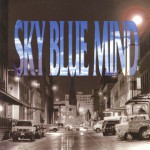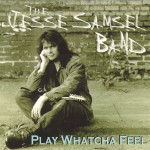 Grindstone
Grindstone
Grindstone
Self-Produced
Here’s an enterprising Sludgemetal quartet who offer enough ingenuity and versatility to rise above the mire, while mostly maintaining a characteristically heavy, forebodingly morose mode of operation. Vocalist/guitarist Lamar Stilwell has obviously studied at the Layne Staley school of delivery, capturing resonant nuances closely associated with the Chainman. His supporting crew, lead guitarist Chris Hyde, bassist Tony Miller and drummer Travis Ludahl, ably navigate the stormy seas of their particular musical genre, diversifying their approach with sufficient regularity as to avoid complete predictability.
“Come Alive” rides upon Ludahl’s furiously frenetic drums and the familiar crunch of overdriven guitars, as Stilwell belts out the vocal. A fairly memorable chorus, with imaginative harmonies, and a fiery guitar solo from Hyde helps this workman-like effort to lodge itself deeply within the brain. Somewhat more straightforward is the relentless drive of “Threshold,” where guitars and bass traipse solemnly across the same dark riff, as Stilwell attempts to purge himself of various demons.
The first significant departure from the typical Metal format occurs with “Cleansing,” where, through the verses anyway, the guitarists retreat from the unyielding buzz of sludge riffage. It is a portentous move that echoes within “Days Ahead.” Over a sample of a scratchy old vinyl recording (implying, it is supposed, that the song was unearthed from some arcane collection of obscure early ’70s Metal albums), Stilwell turns in a soulful, yearning vocal against jangly guitars. The guitars slowly gather momentum as they become more dense in the chorus. Rhapsodically, the twin guitars and bass meander through a classic solo section, before giving way to the impassioned vocals of the remaining sections. One of their better songs.
“Everything” employs a grungier feel, reminiscent of early Stone Temple Pilots, including Stilwell’s reasonably accurate impression of Scott Weiland on vocals. And “Mir” moves still further away from standard Metal practices. Utilizing a plaintive guitar figure with a slight Latin feel, the band reins in its explosiveness, erupting in the choruses and the finale with volcanic power.
But the unabashed winner of the set is “Hollow Eyes.” With its reverberations of Aerosmith and Van Halen in the riffs and Stone Temple Pilots and Alice In Chains in the delivery. The wild, aboriginal chorus, with an infectiously swampy rhythm and mesmerizing second vocal, indicates a definite direction for the band to pursue in the future.
Again with “Soul Spent” the guitarists move away from the Metal platform they established early on the album, leaning this time toward the more discordant nature of Smashing Pumpkins’ Billy Corgan and James Iha. Over a more stripped down arrangement of Miller’s tribal bassline and Ludahl’s sweaty jungle toms, Stilwell mimics Layne Staley’s sneering, leering vocality with evocative assurance.
Grindstone display amazing cohesiveness in their ensemble work. While often treading familiar musical ground, their conviction and enthusiasm are never in question. Though a little heavier and less melodic, nevertheless the band calls to mind the late, lamented Skiploader in their ability to slide through styles without abandoning their musical focus.
If the band were to concentrate on their songwriting, finding ways to be more melodic without sacrificing their intensity; and if Stilwell could find more original ways to use his formidable vocal apparatus, Grindstone could easily become a substantial force in the local Grunge/Metal community, and possible even the world at large.
 Various Artists
Various Artists
From Portland With Love
Resistor Records
With a mission statement that reads, in part: “These are bands that we personally thought didn’t get enough of the ‘propaganda’ that seems to influence the general public (i.e. press, radio etc.). All deserve it, but it is a poor measure of ‘success’ since most of it is based on one person’s opinion.” — one is inclined to dismiss this project out of hand as an attempt by a spurious socialist organization to curry favor with the proletariat in order to dispense their subversive message. However, it is much simpler than all that.
Certain things are required of a band which seeks to secure the “propaganda” generated from “one person’s opinion.” First off, it’s important that any band play live and develop a following that extends substantially beyond their community of mutual friends. Try getting those folks to show up to your 94th gig. Secondly, once a band has availed itself to record a piece of “product,” it behooves them to dispense it to any publication whose demographic seems anywhere close to their own. Remember, that “general public” whose taste you wish to “influence” bears an embarrassing resemblance to a flock of sheep who will bunch impulsively at the mere mention of “the next big thing.” They can be led to slaughter. How sharp is your knife?
But, if you think any propaganda dispenser in his/her right mind is going to run down to the local record shop with the implicit intention of purchasing your unknown product in order to satisfy some wordless cry from the depths of his/her soul, you my plain-feathered socialist comrade, are barking up the wrong end of the capitalist pigsty. There are better, more believable and far more reliable rides at Disneyland.
Short of the obvious: outright bribery, nothing seems to warm the cold, reptilian blood of a propagandist more than something new and undiscovered. The shiny lure of originality will sometimes draw the slithering critic from its lair, whereby it will develop opinions that will influence the minions. More often than not, the arbiter of all that “succeeds” will be disappointed, finding merely a knockoff of something already available for general public consumption.
The particular problem in attempting to co-opt the general public’s severely limited attention span, is that most of the bands represented upon this compilation are decidedly esoteric and out of the mainstream. In and of itself, this is not a sin, but it inherently limits the purveyor of propaganda in his/her attempts to sway the mercurial appetites of the general public.
Of the fourteen acts presented on this collection, the standout tracks, whadyaknow, seem to be from bands that have been gigging out among the general public for a while. Their music seems tighter, with a clearer focus and for the most part, more amenable to the worrisome consumptive whims of the masses.
The foremost “big name” we have here is Rollerball, who contribute “Trallston,” a Zappa-like epic that recalls the acid-drenched works of Brian Wilson during his Smiley Smile period with the Beach Boys; just before he started wandering down Highway 101 in his bathrobe, shaking down passing motorists for cigarettes and cans of Pepsi. But if the fancy of the general public will it to be so, then this propaganda panderer posits: go for it.
Of, perhaps, more general appeal would be “Grey Car Valentine” by Xing. Over a bed of lush synthstrings and gurgling ring modulators, the band unleash a satisfying number that calls to mind the more inventive and alluring aspects of Roxy Music and Depeche Mode, as well as any number of lesser known English Art/Pop bands. Very cool. And quite unusual for these parts.
Spectator Pump provide a disturbingly contrite little ditty, “Wet Ears,” for consideration. Weighing in somewhere between the cynicism of early Liz Phair and the angst-laden bitterness of PJ Harvey, the vocalist sings in a detached voice, standing among droning hives of Lush-like guitars. Another very solid entry of considerable merit.
The quirky Creepy Olde Trucks furnish the sampler with a challenging piece entitled “Bblurry.” which would seem to embrace the methodologies of such disparate influences as Styx, Violent Femmes, Jeff Buckley, Adrian Belew and possibly Jellyfish, or a resultant configuration derived thereof. This band would do well on a live bill with Here Comes Everybody.
Of the uncelebrated bands, Stereo Crush shows promise, sounding vaguely like an, as yet, unrealized incarnation of David Bowie with “Like A Brick.” Over jaggedly strident guitar figures, vocalist Johnny Crash ululates with deft precision. Joys Of Oil donate the incendiary instrumental, “Hunting,” a provocatively cerebral guitar romp involving several well-placed samples of indigenous natives, as well as various other oddities. Boy Crazy create a Cocteau Twins like aura with “Little Guns,” applying the vibes to parts ordinarily played on guitar. A faux ’60sish sound results. Spurge combine piano and organ phrasings
Hopefully the mighty wheels of the great propaganda machinery are already in motion, turning to expose these musical entities, rendering unto each and all their just due beneath the harsh glare of the general public eye— if that’s what they really want. But if any of them are truly so naive as to think that “success” is achieved so simply as to assemble a few press clippings, a few minutes of local airplay and wait for the labels to come acallin’, they are scheduled to board the enormous train known as Reality, due to arrive any minute now.
 Sky Blue Mind
Sky Blue Mind
Sky Blue Mind
Self-Produced
A skilled crafter of pop songs, a singer of gritty agility, an able and adept guitarist, Rich Treece the raison d’etre of Sky Blue Mind, would appear to have it all going on. Bassist Rick and drummer Mark Raney are excellent in their supporting roles, but the show clearly belongs to Treece.
Think of a Craig Carothers 33 at 45 and you’ve pretty much captured Rich’s approach. It is readily apparent that he has worked very hard to develop his singular style, so much so that oftentimes it is difficult to distinguish one song from another. The lyrical content, while certainly above the level of cliché, fails to divulge much about the guy, other than the fact that he’s mostly in the dark about interpersonal relationships, values the ones he has and longs for the ones that got away. That would more or less summarize his very personal world view.
Similarly, Treece sings all the songs in the same register, where the patented sandpaper rasp of his voice slowly wears away at the listeners ear to the point where he becomes virtually inaudible compared to the pink noise he creates.
Two songs stand out among the dozen found here. “Torch” kicks off with an acoustic guitar theme loosely modeled after Neil Young’s “Heart Of Gold” or any number of Toad The Wet Sprocket songs. Thick electric guitars join in the cerebration surrounding Rich’s heroic quest: “In the window of my heart there’s a flame, it casts a shadow on me/A silent candle that burns in your name, and while I hold it I’ll never be free/Though I’m not made of stone, I will carry my vigil alone/Lonely is the candle’s flame, holy altar burning true/Lonely is the candle’s flame, I keep it burning for you.”
Perhaps a more realistic portrait is that painted on “Exit My Heart.” Again, a familiar Toad-like acoustic guitar figure sets the scene, Treece emitting a vocal that borrows slightly from Peter Gabriel, in a way similar to the new and improved Dave Matthews. Rich’s sad depiction of the dissolution of a relationship is obviously taken from first-hand personal experience, certainly more than a creative figment of his imagination. Skip Parente’s mournful violin adds to the sad finality of the song.
Despite the intimate nature of the subject matter of his songs, Rich Treece remains distant from the emotions contained within them, relying instead upon a single vocal technique to evoke the desired results. While the gravelly texture of his voice might carry a song or two, it cannot withstand the repetitive nature of his songs.
While Rich Treece proves himself to be a talented songwriter and a capable singer, his self-imposed limitations in both categories narrow the scope of his effectiveness, robbing his music of the emotion and sincerity he so evidently wishes to convey. His cause would be greatly aided in his songwriting by a widening of his world view to include members of society outside of his inner circle and a loosening of his strict policies regarding his vocal delivery. Perhaps by digging a little deeper inside himself he may tap into some universal vein of consciousness where his words will be as wise as they are well-turned.
 Jesse Samsel
Jesse Samsel
Play Whatcha Feel
Rooftop Magic Records
Guitarist Samsel, whose time on the local boards extends far enough back to include a stint with Meredith Brooks and the Angels Of Mercy presents a varied assortment of laidback sounds, mostly rooted in the Blues, but with occasional excursions outside the genre. Enough variety to keep the set interesting.
He is, without doubt, a better guitarist than a vocalist or songwriter, but his pleasant attitude and sunny demeanor keep things from bogging down. Steady bass and drumwork, provided by two separate backup duos and Jeff Alviani’s (once of the late, great Cool’R) indelible keyboard action, provide a sturdy foundation for Samsel’s gentle deliberations.
Tasty guitar solos abound, from the crisp JJ Cale feel of “Daddy Liked Playin’ The Blues,’ to the crystalline Jazz facets of the nocturne “Last Few Miles To Home,” to the swamp drenched of the chuggling “Angry Suspicion.”
Honestly, it sounds as if life is just to good for the easy going Jesse to be singing the Blues. His music seems far sunnier, bringing greens and golds into the picture. There is nothing earthshattering here, just the sound of a guy who enjoys doing so, making music on his guitar.
